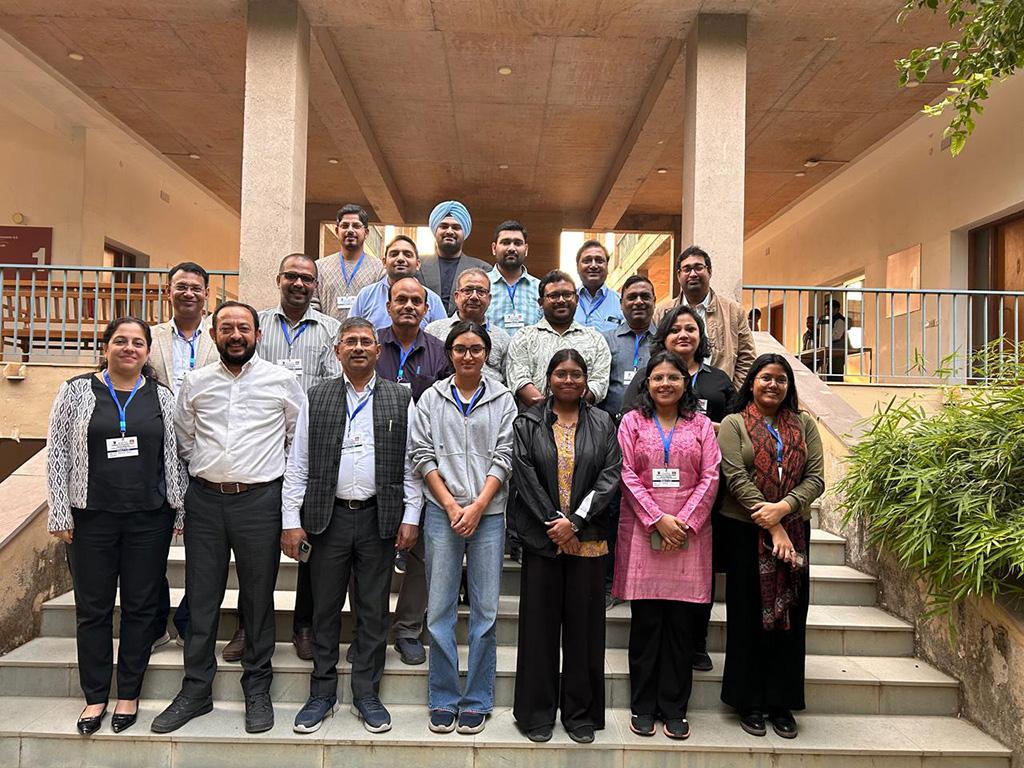Training Programme on Heat-proof Cities- Pathways for Sustainable Cooling and Heat Mitigation
The residential training programme onHeat-proof Cities: Pathways for Sustainable Cooling and Heat Mitigation was organised by the Sustainable Habitat team at the Centre for Science and Environment (CSE). The programme was held from November 11–14, 2025, at the Anil Agarwal Environment Training Institute (AAETI), Tijara.
We had an excellent turnout of 22 participants, including representatives from Rajasthan Town Planning Department, AMRUT Centres, GNDU, Institute of Town Planners India (ITPI), National Research Development Corporation (NRDC), Caritas India,CPWD and academic institutions such as Malaviya National Institute of Technology (MNIT) and National Institute of Technology (NIT) Patna. This diverse group brought valuable insights from their respective fields, enriching discussions on climate impacts, risks, and the strategies being adopted across urban areas.
The programme opened with an ice-breaking session featuring a poll to gauge participants’ understanding of climate risks and vulnerabilities in cities, setting the tone for the technical sessions ahead.Mr. Rajneesh Sareen, Programme Director, Sustainable Habitat Programme, delivered the opening session on climate change and vulnerabilities, highlighting how extreme events like floods, droughts and heatwavesare becoming more frequent and pose emerging challenges to urban infrastructure.This was followed by a session by Ms. Mitashi Singh, Programme Manager, on policy levers and mainstreaming climate resilience in cities.Mr. Rajneesh Sareen then took a detailed session on Environmental Impact Assessment (EIA) with a focus on construction projects, followed by an introduction to the Cooling Master Plan framework, explaining pathways to reduce cooling demand through energy-efficient buildings, renewable energy integration, and district cooling systems. He also demonstrated solar-assisted and waste-heat recovery systems for improving energy efficiency.The day concluded with group-based quiz activities and videos on urban heat, followed by a demonstration of the institute’s cooling systems by Mr. Rajneesh Sareen.
The second day began with a session by Mr. Rajneesh Sareen on the Energy Conservation and Sustainability Building Code (ECSBC) 2024 and Eco-Niwas Samhita (ENS) 2024.Ms. Sayani Sen, Programme Officer,then conducted an exercise under the Sustainable Habitat Programme, after which participants broke into groups for discussion.Ms. Gargi Dwivedi, Senior Research Associate, introduced microclimate simulation tools and their applications, leading interactive sessions on heat contributors and mitigation strategies. Using simulation software, participants analysed how built form, materials, vegetation, and water bodies shape local microclimates. They developed neighbourhood-level retrofitting proposals based on shading devices, reflective materials, enhanced tree cover, to reduce heat stress.The day closed with simulation-based heat mapping exercises that helped participants visualise temperature variations and understand the cooling potential of their design interventions.
The third day began with a review of the simulation results. Participants interpreted temperature outputs and discussed the impact of different mitigation strategies under the guidance of Ms. Gargi Dwivedi. Dr. Nimish Gupta, remote sensing expert, then led hands-on exercises on mapping heat-stressed areas and heat sinks using satellite imagery and indicators such as LST, NDVI, and NDWI. These analyses demonstrated how spatial mapping supports climate adaptation and urban cooling strategies.
The day concluded with a tour of the AAETI campus led by Mr. Sugeet Grover, Programme Manager, highlighting the campus’s green features.
The final day began with participant presentations on their group exercise findings, showcasing mitigation proposals for different urban layouts.This was followed by sessions by Mr. Sugeet Grover onLow-Carbon Materialsthat focused on alternative materials like fly ash bricks, recycled aggregates, bamboo composites, agro-based products, that reduce embodied energy in construction. This was followed by a session on Sustainable Cooling Systems which highlighted low-carbon and not-in-kind cooling solutions.The programme concluded with a field visit to the Sehgal Foundation building in Gurugram, where participants observed sustainable and passive design features in practice and gained insights into how integrated architectural strategies can enhance thermal comfort and reduce energy demand.

Share this article